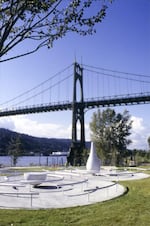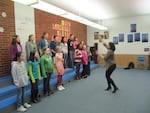
"Water, Please", Don Merkt, 1997, Aluminum and stainless steel sculpture. This work, sited at a water bureau lab in north Portland, is one of the hundreds of works in the public art collection that is part of RACC's mandate.
Courtesy of the Regional Art and Culture Council
Chris Coleman is the artistic director of Portland Center Stage. He makes occasional trips to New York City to take in the East Coast theater scene and stay in touch with other professionals on the East Coast. When he was in New York last week, sitting in a theater waiting for a show to begin, he had an interesting and unexpected conversation.
“I was just kind of chatting with this woman next to me," Coleman explained. "She said, ‘Where are you from?’ I said, ‘Portland.’ She said, ‘Oh, you’re looking for a new director for the Regional Arts and Culture Council.’ I said, ‘How do you know that?’ She says, ‘Oh, a friend of mine is interested in applying.’”
We can safely conclude the word is out: Portland is looking for a new person to oversee its $9 million arts administration office.
The Regional Arts and Culture Council, or RACC, is not technically a city office or bureau. It’s an independent nonprofit contracted by the city to direct arts granting and services using city and county funds, as well as revenue from the regional arts tax.
RACC's influence is huge. Its grants support everything from the city’s swankiest performance venues to film screenings in prisons, edgy Old Town Galleries to elementary school classrooms.
During RACC’s annual State of the Arts report in late spring, a choir of elementary students from Boise-Eliot/Humboldt PK-8 serenaded Portland City Council — their music instruction was funded by revenues RACC sent to schools from the arts tax. The kids were followed by a documentary filmmaker, a theater actor and director, a teaching artist, and others, testifying about other projects RACC funding made possible.
Outgoing director Eloise Damrosch is a low-drama administrator who came out of the city’s public art program. She spoke during the State of Arts presentation about how RACC’s game has changed during her time.
“We started as a tiny but mighty little bureau of Multnomah County and the city of Portland,” Damrosch said. “Now, many years later, we’re a flourishing tri-county, nonprofit arts council. Because of that we can expand our services and opportunities across the region.”
She talked about the flexibility RACC has shown, setting up programs that could not have originated in a city bureau — like the Right Brain arts education initiative, helping teachers work art into their curriculum as they teach kids things they need to know for standardized tests. Also, RACC’s Work For Art program, which fundraises for art in the business community, probably wouldn’t have been feasible as a government structure.
But since June, when Damrosch’s retirement brought her 30-year tenure steering Portland arts to a close, RACC has been looking for a new direction.
"Eloise has been there for so long, people are wondering: What next?" said Portland Commissioner Nick Fish, who oversees the arts portfolio. He's not part of the search committee looking for Damrosch's replacement but has talked about priorities with RACC board members.
"There are a lot of urgent questions about the future," he said. "From my point of view we're looking for a strong leader, someone who has a record of building strong community partnerships. We need a cheerleader, someone who's an effective communicator, who can get up in front of any setting, a business group, a visiting delegation, a student group, and make the case for art."
RACC gets about 70 percent of its budget from the city of Portland, with much smaller streams of funding from Clackamas and Washington Counties, and Metro regional government.
RACC organizes peer review grant panels, gives out millions in project grants and operating support, commissions and maintains works for the city’s public art collection, and does some advocacy at the state and local level.

RACC's menu of services includes distribution of arts tax revenues throughout Portland's school districts. The cash pays for art and music teachers like this class, in the Centennial district's Oliver Elementary.
Rob Manning / OPB
Jeff Hawthorne is RACC’s long-standing director of community engagement. Since Eloise Damrosch retired, he’s stepped in a role as interim executive director. He points out there are some RACC functions, like public art, specifically laid out in its contract with the city.
Other obligations — like education work and workplace giving — aren’t spelled out in the contract.
“Our mission is broadly defined,” Hawthorne said, “to enrich our communities through arts and culture. On one hand, that gives us a lot of opportunity to add services that are responding the needs of artists art orgs ... but it could also let us experience mission creep. It’s just very broad.”
Thinking ahead to how RACC’s next administrator might come to terms with all these programs, Fish and Mayor Ted Wheeler have asked city Auditor Mary Hull Caballero to audit RACC this fiscal year.
“We’re anticipating a broad review, but until it starts, we won’t have have the specific scope," said Drummond Kahn, who works for the city's audit services division. "In the request letter the mayor and commissioner talk about RACC’s operations pursuant to its agreement with the city, and to look at efficiency and effective delivery of services. So we’ll consider those topics as we try to put sideboards around the question.”
If the audit can shed some light on what’s being done, and how efficiently it’s done, the thinking is, the next executive director will be able to set some new priorities.
In weeks to come, we’ll introduce you to some of the people searching for RACC’s next director, and talk about some of the competing needs for Portland, a city with a lot of creative spirit — and a lot of gentrification problems to match.
